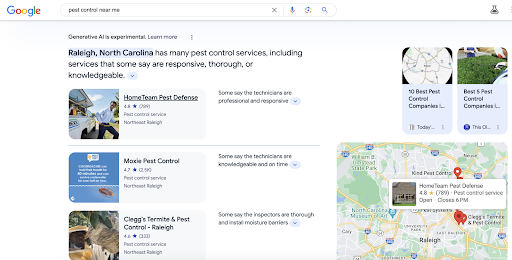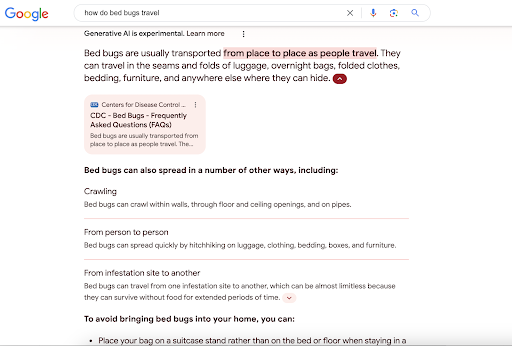Google's Search Generative Experience: What You Need to Know For the Home Services Industry

In an era where endless information is at our fingertips, Google continues to push boundaries with its latest innovation, the Search Generative Experience, or SGE for short. This feature integrates AI into the world's most-used search engine, potentially revolutionizing how billions of people search for information every day.
As thought leaders in the digital marketing and home services industry, let Coalmarch by WorkWave take the guesswork out of Google’s nonstop changes. We’ll show you how this new AI feature functions and how it may affect your home service business in the future.
Here’s What You’ll Learn in This Article:
- Google’s Search Generative Experience (SGE) uses AI to provide users with instant information on the SERP, aiming to simplify searches
- SGE is still in beta but a full rollout is expected in 2024
- SGE is poised to transform the search experience and impact search traffic as a whole
- Despite this, having a web presence is still crucial for field service businesses
- As SGE evolves, it will also be important to monitor and adapt strategies for your website, PPC, SEO, and user engagement
If you want more in-depth information, continue reading.
What is Google’s Search Generative Experience?
SGE, short for Search Generative Experience, is Google's experiment to enhance the search process using AI technology. SGE aims to provide users with a snapshot of information within the traditional Search Engine Results Page (SERP).
Google's goal with SGE is to take more of the work out of searching for users so they can understand topics faster, uncover new viewpoints and insights, and get more information easier. Going back to Google's company mission -- to organize the world's information and make it universally accessible and useful—generative AI is meant to make the search process as a whole more convenient for users.
When Is This New Feature Officially Rolling Out?
SGE is currently still in beta. Google initially scheduled the experiment to end last year but has extended it indefinitely due to significant changes throughout the process. Though no clear release date has been announced, it's anticipated that Google will officially launch this feature to the public sometime in 2024.
What Does SGE Look like on the Results Page?
The appearance of SGE in the Search Engine Results Page (SERP) varies depending on the search query. Let’s break it down into two types of searches: searches with commercial-driven intent and searches with informational intent.
Searches with a Commercial-Driven Intent
Commercial intent refers to the likelihood that a user's online search is motivated by an intention to make a purchase or engage in a transaction. In the context of keywords, commercial intent reflects the degree to which a specific keyword or search query indicates an interest in purchasing a product or service. For the home services industry, these are the most valuable keywords of all, as they are the most likely to convert into a lead or sale for your business.
For commercial-driven searches like “pest control near me,” users may encounter AI-generated results nestled between traditional pay-per-click (PPC) ads and organic results, requiring them to hit a "generate" button to view the SGE results.
When generating SGE results, a list of five to seven companies will be displayed, with links to their Google Business Profiles (similar to the local pack), as well as AI-generated snapshots of the business, like "some say the technicians are professional and responsive" or "some say the inspectors are thorough and install moisture barriers." It’s unclear if the information from these snapshots is being pulled in and summarized solely from Google reviews or also from the website.

Searches that are Informational or Research-Oriented
Keywords with low commercial intent are more informational or research-oriented. These may include general questions, educational queries, or broad topics that do not necessarily indicate an immediate intent to buy.
For an informational search like “How do bed bugs travel?” The AI-generated results automatically appear at the top of the SERP, akin to featured snippets but with more contextual information and options to explore the topic further.

What Are the Key Features of SGE?
Regardless of the search, a key feature of SGE is the suggested next steps, including the ability to ask follow-up questions. For the query "how do bed bugs travel?" some of the automatic follow-up questions are, “can bed bugs travel on a person?" and "how do you stop bed bugs from spreading?" For "pest control near me," some of the follow-up questions are, "how much is a pest control service?" and "is it cheaper to do your own pest control?"
Context will be carried over from question to question to help users more naturally continue their exploration. Again, this is still in beta, so there is a good chance it may look and function differently when it officially rolls out.
Where is SGE Data Sourced From?
A recent poll suggested that 29% of adults and 40% of millennials would make the switch to using SGE, and that 25% would trust those search results fully, even at this early stage, which is surprising… but maybe not if you understand where the information is sourced from.
Mostly, it looks like Google's “AI-powered search” is simply summarizing what its current algorithm has already deemed authoritative content, meaning the content is being sourced from websites that are already in Google’s existing index. This is a good sign for businesses that already invest in local SEO and prioritize Google search in their marketing strategy, as they will likely have good visibility in these AI-powered snapshots.
What Are the Potential Implications for Home Service Websites?
In essence, SGE aims to simplify the information-gathering process, empowering users to swiftly find information without the hassle of navigating numerous websites. Google's platform has been moving towards providing as much information as possible on the SERP, leading to more and more zero-click searches.
What Are Zero-Click Searches?
Zero-click searches are when users can find the answers they’re looking for right on the SERP without having to visit any external websites. Google makes this possible by displaying more and more relevant information directly in the search results. To learn more about this topic, check out our blog on What Are Zero-Click Searches and How Does it Affect Your Business?
Will Zero-Click Searches Increase with SGE?
Yes. We will undoubtedly see more and more zero-click searches as SGE fully rolls out, which means there will likely be a reduction in overall traffic to websites in the future. According to recent studies, the AI-powered search engine is expected to trigger a significant decline in search traffic, ranging from 20% to 60%. Before you fret, don’t worry, this isn’t all bad news, and it will vary from industry to industry, with informational websites likely seeing the most significant impacts.
Does This Mean My Website Won’t Matter Anymore?
Absolutely not. This shift doesn't diminish the importance of websites; rather, it encourages us all to reevaluate a website's value and function. Even if users bypass direct visits to your site, your website will remain the primary source of information about your business, and Google will continue to use that information to determine how your website should rank, whether on traditional results or AI-generated results.
At the end of the day, users will go to Google to search for and find the solutions you provide; they just may not make it to a website and instead will make a decision based on your Google Business Profile. With that being said, having visibility on Google is still going to remain paramount, and your website will continue to be one of the primary mechanisms to feed that information to Google.
All this is to say, as zero-click searches continue to rise, business owners and digital marketers will have to identify new and different ways to measure results if traffic is no longer the ultimate indication of search “success.” This will need to result in more of a focus on impressions, interactions with your Google Business Profile, and overall SERP visibility.
What now?
As Google continues to refine and roll out SGE, it's essential for digital marketers and business owners alike to understand its implications. While questions remain regarding its impact on PPC, SEO, and overall industry dynamics, staying informed and adaptable will be key.
In the coming months, Coalmarch by WorkWave will continue to monitor this evolving landscape and provide insights to our customers to help them navigate these changes effectively. Stay tuned for updates as we strive to stay ahead of the curve in this dynamic digital ecosystem!